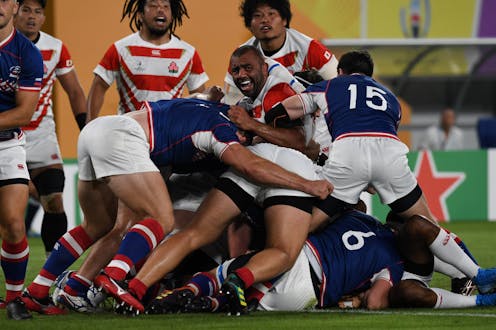What’s Japanese for ‘ruck’? Turning rugby’s technical terms into an international language
- Written by Averil Coxhead, Professor in Applied Linguistics and TESOL, Te Herenga Waka — Victoria University of Wellington

The winter rugby season is well under way, with fields and sidelines ringing to the unique language of the game. Learning this vocabulary comes through playing and talking about the game, no matter if the players are in Taranaki, Twickenham, Tonga or Tokyo.
If you know the terms – back, penalty, intercept, front row, scrum, clean out, advantage line, ruck, offload, prop, loosies and so on – chances are you’re a rugby fan, a player, or both.
Now spare a thought for those players, coaches and administrators plying their trade in a foreign language country. They must be able to communicate at a technical level with other coaches, captains, referees, teammates and perhaps even media.
Rugby language is predominantly spoken. It’s mostly used at training sessions, during warm-ups and games, in dressing rooms, in television or radio commentary, in homes, workplaces and even at a pub after the game.
But learning a language through speaking it, especially in pressure-cooker situations such as training or a game, can be highly stressful. Knowing the difference between a “loosie” (loose forward) and a reference to the ball being “loose” may seem like Rugby 101 to aficionados, but games are played at speed and spoken language moves fast too.
One way to reduce that stress is to have a shared vocabulary of key words and phrases that everyone can learn and know in advance – and that was the aim of our research[1].
We set out to establish the words and phrases commonly used in rugby in English. The goal is to create technical word lists to help native and non-native English speakers alike prepare for playing, coaching and talking about rugby in foreign environments.
The rugby vocabulary
The game of rugby originated in England, so it stands to reason the first language of rugby is English. But since the game became professional in 1995, there has been a huge increase in the number of players and coaches moving between English-speaking countries and places like Japan and France, with their highly lucrative top competitions.
With a world cup every four years, and millions of people playing at various levels, rugby is a truly international sport – and it’s growing. A common rugby language should make mobility within the international game that much easier.
Read more: Art or science? Decision-making in rugby[2]
To create our rugby word list, we used recordings from actual rugby team interactions and television commentaries. From these we identified words that occurred more often in rugby than in general English.
Three experts with more than 50 years of combined rugby experience then checked the meanings of the words and confirmed the ones that are technical to rugby, such as “loosie”, “ruck”, “maul” and “prop”.
The same procedure was followed for phrases with technical meanings, such as “swing it away”, “clean out” and “advantage line”.
Language rules
The resulting “Rugby Word List” contains 252 technical words and 267 technical phrases. This vocabulary accounts for around 12% of all the words in our original rugby recordings, which means roughly one word in every ten is technical.
We found six words unique to rugby: scrum, lineout, ruck, loosehead, loosies and tighties (the five core forwards in a scrum).
A further 84 words are used in rugby but also have a general meaning in English – for example, “advantage”, “conversion”, “drill” and “try”. Because people can assume they know the word already, these can pose a challenge to learning. The rugby context requires an understanding of aspects of the game and the use of a technical English vocabulary.
Read more: Six Nations: why more rugby referees should be bilingual[3]
The list also contains a large number of words used in rugby and in general English with the same meaning, like “referee”, “kick”, “field” and “replacement”.
The phrases were identified firstly through finding the core or root structure – that is, the word strings that occurred most often, such as “advantage line”, “knock on” and “the ball”.
The next step was to identify the words that occurred regularly before or after the core structures. For example, words that can appear before “the ball” include “over”, “off”, “onto” and “with”. For “advantage line”, the preceding word is often “over”, and “knocked on” often appears as “knocked on by”.
The translation game
The resulting list can be used by rugby players and coaches, but also by people new to the game.
Those planning to play or coach rugby in English or non-English-speaking countries can use the list as a way to structure their learning of these technical terms in the new language – be that French, Japanese or Spanish or English itself.
Read more: Brains not brawn is the key to success in international rugby[4]
Specialised language courses for rugby players and coaches can be developed using the list to ensure they learn the vocabulary they’re most likely to encounter in rugby settings.
The list is being used as the basis for the development of an app, and is being translated into Japanese. This is a large undertaking requiring bilingual speakers with expert knowledge of the game, but we hope other languages will follow.
The resource will be useful for the ever increasing number of players wanting to play abroad, and should help establish a common language in an already international game.
Stuart Benson is a co-author and keen rugby player whose research formed the basis of the Rugby Word List.
References
- ^ our research (cdn.theconversation.com)
- ^ Art or science? Decision-making in rugby (theconversation.com)
- ^ Six Nations: why more rugby referees should be bilingual (theconversation.com)
- ^ Brains not brawn is the key to success in international rugby (theconversation.com)

















